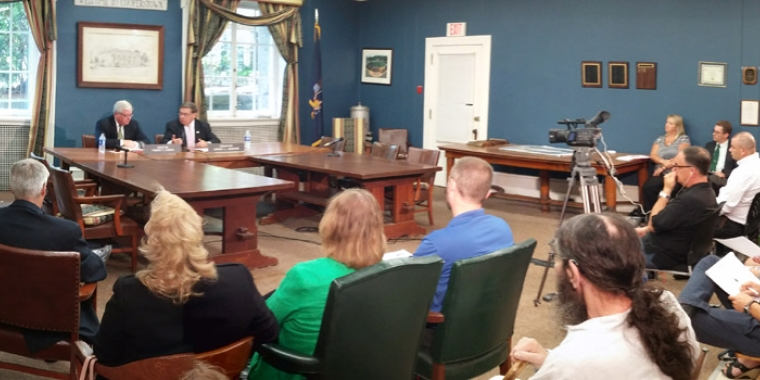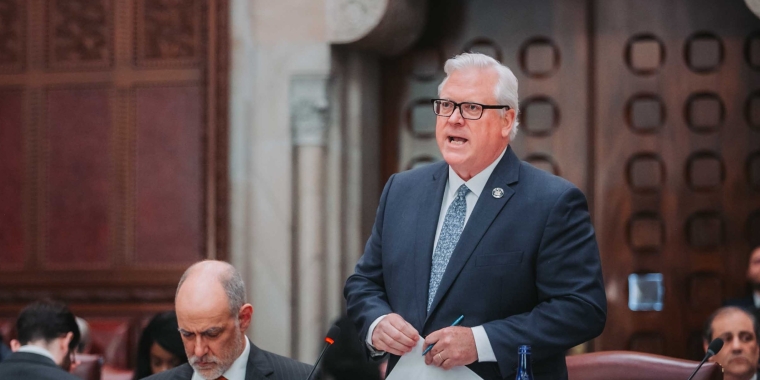
State Senate forum keeps focus on crisis facing rural public transportation ~ O'Mara and Seward hear from local leaders, transportation officials from throughout NY (UPDATED, July 23 - Watch video replay of the forum)
Thomas F. O'Mara
July 21, 2015
-
ISSUE:
- Transportation

[July 23, 2015: A video replay of the July 22nd forum is currently available for viewing HERE]
Cooperstown, N.Y., July 22—New York State Senators Tom O’Mara (R/C/I-Big Flats) and James L. Seward (R/C/I-Oneonta), whose Upstate, rural legislative districts are being hurt by state-level changes underway in the management of Non-Emergency Medical Transportation, held a “New York Medicaid NEMT Roundtable Discussion” today in Cooperstown.
The Senate roundtable began at 11:00 a.m. at the Cooperstown Village Library on 22 Main Street. The senators received testimony from local leaders and transportation management officials from Central and Western New York, the Mohawk Valley, the Hudson Valley, the Southern Tier and Finger Lakes regions, and the North Country to testify on how state reforms are negatively impacting public transportation in the rural communities they serve (see above photo and additional photo HERE).
In a joint statement, O’Mara and Seward said: “The state’s ongoing Medicaid redesign effort in Non-Emergency Medical Transportation represents a significant shift and major changes in public transportation services in many areas, but especially in the rural, upstate regions we represent. The future of public transportation is being put at risk by Albany’s attempt at a statewide, one-size-fits-all approach to these local systems. It’s a developing crisis for many rural residents. So we’re trying to bring more widespread attention to the changes underway, fully assess the consequences for our counties, and do what we can to ensure that the impact on rural public transportation at least receives a full and a fair hearing."
[UPDATE, July 23: Watch a report from WBNG-TV, ”Local bus systems suffering due to shift in Medicaid funding", and read more in the Oneonta Daily Star, "Area patient: Medicaid ride system is a 'nightmare'"]
According to the senators, since 2013 the state’s comprehensive Medicaid redesign strategy has included a shift in the administration and management of Medicaid Non-Emergency Medical Transportation (NEMT) from localities to the state. It’s been viewed as a cost-cutting move by state officials, but many local officials from across the Upstate region have raised concerns about the plan and, especially, the impact the state takeover is having on rural communities and populations, including the disabled and the elderly, as well as the rural workforce.
The state Department of Health (DOH) administers NEMT and has transitioned the management of transportation systems that were previously administered locally to a state-level transportation management system operated out of Albany. But local officials, mobility managers, transportation providers and community organizations in Upstate rural regions say that the new, one-size-fits-all approach, which might be workable in suburban and urban areas downstate, isn’t proving cost-effective or efficient in their rural communities.
Consequently, a number of these officials and providers are in Cooperstown today to discuss the shortcomings of the new system, including the elimination of existing transportation routes, the future of locally based cost-efficiency initiatives and the overall disruption of services to persons with disabilities, seniors and other local residents who have long depended on these rural public transportation systems.
Regional officials attending the July 22nd Cooperstown forum are: Broome County Commissioner of Public Transportation Greg Kilmer; Nick Cecconi, Rural Health Net ECNY (Broome County); Jim Arey, Elmira-Chemung Transportation Council; Jim Gorman, District Manager, First Transit (Chemung County); Jan Dempsey and Jackie Leaf, Seven Valleys Health Coalition; Jamie Mott, Regional Manager, Rochester Genesee Regional Transit Authority; Robert Zerrillo, Policy Director, New York Public Transit Association, Inc.; Sam Purington, Volunteer Transportation Center (Jefferson, Lewis and St. Lawrence counties); Sara Freda, Department of Economic Development and Planning, Lewis County; John Prospero, Arc of Livingston-Wyoming; William McDonald, Executive Director, Medical Motor Service (Monroe County); Michael DeRaddo, Director of Transportation, Ontario County; Gary Mashaw, Director of Transportation, Oswego County Opportunities; Karen Sullivan, Director of Planning Department, Otsego County; Peggy Bush, Regional Manager, Birnie Bus Service, Inc. (Lewis, Madison and Otsego counties); Amber Simmons and Jeanette Frank, Arc of Schuyler; Dwight Mengel, Chief Transportation Planner, Tompkins County Department of Social Services; Bob DiBella, Director of Public Transit, Ulster County; Nancy Hampel, Mobility Manager, The Parkway Center (Fulton, Herkimer, Montgomery, Oneida, Otsego and Schoharie counties); Dot Richter and Barbara Crannel, Community Care Network of Nichols (Tioga County); Shawn Yetter, Tioga County Department of Social Services; Melissa Paradies and Shelly O’Reilly, Ulster-Green ARC; Dan Dineen, Director, Cortland County Planning Department; Dana Crisino, Program Manager, and Barbara Hauck, Associate Planner, Herkimer-Oneida Counties Transportation Study (HOCTS); Kelly Duby, Steuben Coordinated Transportation Mobility Manager, Institute for Human Services (Steuben County); Kelly Byrnes, Otsego County Planning Department; Paul Paterson, Oneida Public Transit; Alan Rubin, A+O Transport (Otsego County); Rebecca Hoskins and Nancy Dougal, Essex County Public Transit; and Roberta Zehr, Lewis County Department of Social Services.
A similar roundtable was held in Albany in early 2013 when the reforms were just getting underway (Watch a replay of the 2013 forum HERE).
Additionally, the legislators are seeking the enactment of legislation the Senate unanimously approved earlier this year (S.5794/A.8202), which O’Mara sponsors and Seward strongly supports, that would reconstitute the state’s “Interagency Coordinating Committee on Rural Public Transportation” in order to establish an active, collaborative forum for local representatives and state agency officials to fully examine the impact of state-level actions on public transportation in rural regions. The committee would be charged with taking a look at and issuing an annual report to the governor and the Legislature on a range of issue areas including:
> existing rural transportation systems including data on ridership, revenue and other challenges for each system;
> a county-by-county analysis of costs savings, modes of transportation, reimbursement schedules, and public transportation utilization rates resulting from the state’s ongoing Medicaid redesign initiative; and
> the overall impact of reductions in state transit operating assistance on rural public transportation.
The legislation was given unanimous Senate approval on June 16th but no action was taken by the state Assembly, where it’s sponsored by Assemblyman Anthony Brindisi (D-Utica).
Share this Article or Press Release
Newsroom
Go to Newsroom


